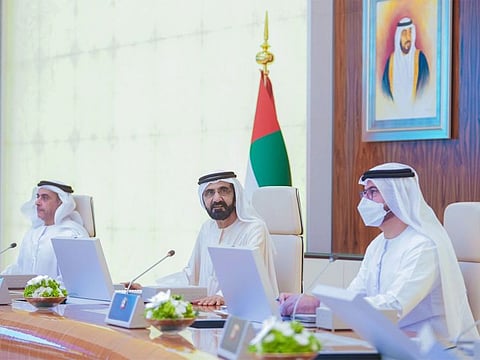UAE cabinet approves national strategy for digital economy
Sector to contribute 20% to UAE’s non-oil economy

Abu Dhabi: The UAE on Monday approved the national strategy for its digital economy that aims to contribute nearly 20 per cent to the country’s non-oil economy -- from 9.7 per cent currently -- in the next 10 years.
During a meeting held at Qasr Al Watan in Abu Dhabi, the Cabinet approved the formation of a special council for digital economy to be led by Omar bin Sultan Al Olama, Minister of State for Artificial Intelligence, Digital Economy and Remote Work Applications.
The cabinet meeting was chaired by His Highness Sheikh Mohammed bin Rashid Al Maktoum, Vice President and Prime Minister of the UAE and Ruler of Dubai.
Digital strategy
The strategy includes more than 30 initiatives and programmes targeting six sectors and five new areas of growth. It will define the digital economy in the country, with a unified mechanism for measuring its growth while measuring its indicators periodically. The strategy will define the priorities of digital economy in the country, ensuring the contribution of all other economic sectors to promote and support the digital economy.
The UAE is among the top 25 per cent of countries in the most important global digital indicators, where the contribution of the digital economy to the economic sectors of the UAE’s GDP is 9.7 per cent, and to the non-oil GDP 11.7 per cent.
Humanitarian efforts
The cabinet has also approved an organisational framework to support external humanitarian work. Under this framework, new coordination offices for humanitarian aid will be opened in a number of countries.
“Our humanitarian work is on the rise and will certainly increase. The UAE will remain a capital for humanitarian work,” Sheikh Mohammed tweeted.
The council of ministers also adopted the national unified standards to licence and encourage family counseling professions.
“Our goal to enhance the quality of life, increase efficiency and help families by providing the best specialists to offer advice in all family matters,” the Vice-President added.
Board restructuring
The cabinet also endorsed a decision restructuring the board of directors of the Higher Colleges of Technology. The new board will be chaired by Dr. Ahmad Belhoul Al Falasi, Minister of State for Entrepreneurship and SMEs.
“We need to improve the output of the education sector, sharpen skills and prepare for a future full of challenges,” Sheikh Mohammed said.
Commercial, financial networks
A number of international agreements have been ratified, including an agreement to link the payment systems of the GCC countries with each other as well as agreements with the US, Denmark and Brazil.
The Cabinet also approved the country's joining the International Partnership for Hydrogen and Fuel Cells in the Economy (IPHE) to support the UAE’s goals in the field of clean energy.



